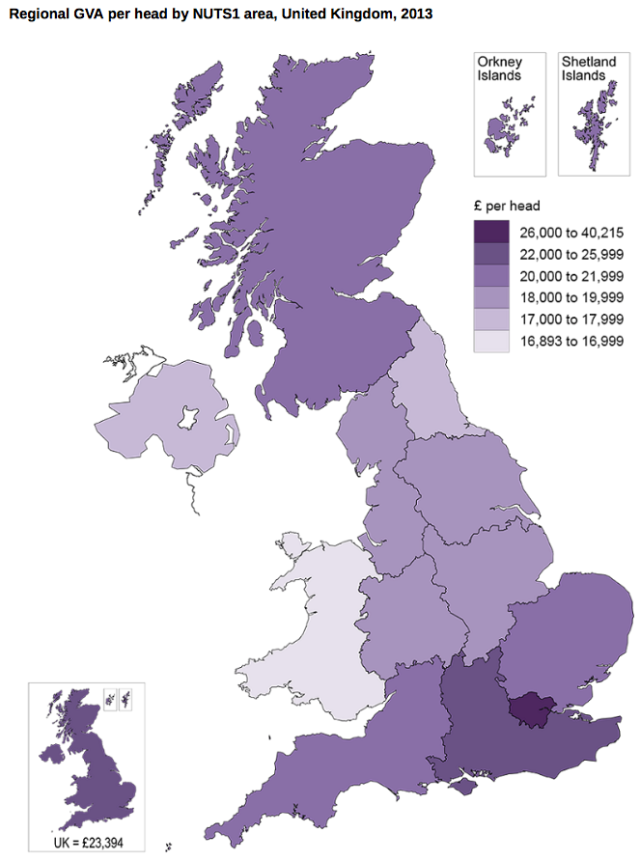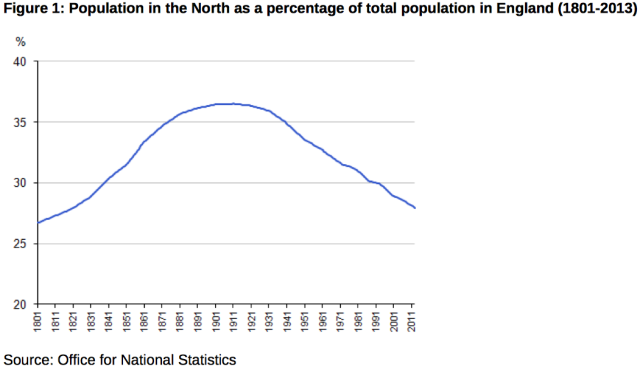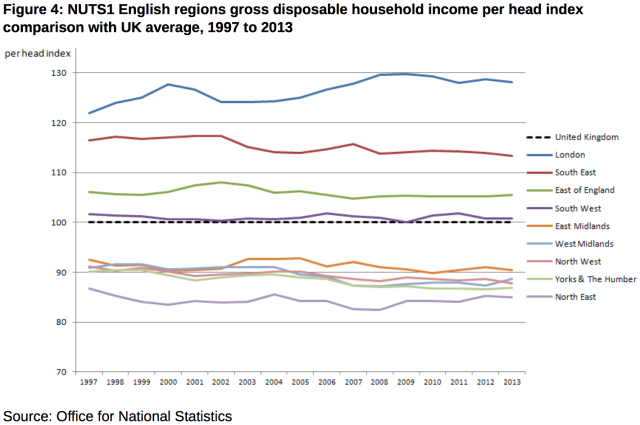The Northern Powerhouse made it into the Queen’s Speech, giving George Osborne a good laugh when Her Majesty mentioned it. The government is pushing ahead with its plans to devolve extensive powers to city regions, starting with Manchester. Devolution to local government, an idea which was loathed by the Thatcher and Major governments, is suddenly the height of fashion and not just in Conservative circles.
The idea gained momentum after the referendum on Scottish independence. It got mixed up with the row about Scottish votes on English laws and became, all at once, an answer to the West Lothian question, a way of stimulating the growth of urban centres outside London, rebalancing the economy, allowing more tax revenues to be raised locally and making services more responsive to local needs. Or something like that. People can project all sorts of things onto what at the moment is still a blank page.
A lot of people seem to think this is a Good Thing but I’m not convinced.
Is it an answer to the West Lothian question?
No. As Vernon Bogdanor says, the only way to get round the problem of Scottish MPs voting at Westminster on things that don’t affect their constituents is to take those things away from Westminster altogether. The cleanest way to do this would be to devolve the powers Scotland has to the English regions but there isn’t much appetite for that.
[A]s long as England rejects federalism, there can be no tidy, symmetrical solution. Asymmetry is the price England pays to keep Scotland within the union.
At the moment, the government is not proposing to give English city regions the same powers as the Scottish Parliament or even the Welsh Assembly, though some people are arguing that it should. If that were to happen, though, it might make the situation worse. For example, if Greater Manchester were to get similar powers to Wales, it would have control of its own health service. What would happen if (or more likely when) a future government decided to reorganise the NHS again? Should Manchester MPs vote on a reorganisation that doesn’t affect their constituents? Devo Manc just replaces the West Lothian Question with the Bury South Question.
Will it give the regions outside London more money?
No. Not unless they raise more tax from their residents and businesses than they do now. There is a lot of talk about regions and cities keeping more of their taxes but if Manchester and Newcastle keep more of their own taxes, then London and the South East will keep more of theirs too. That can only lead to a redistribution of tax away from the poorer regions, unless local taxes are increased to compensate. England tends to get richer the closer you get to London. If these wealthier regions redistribute less of their money, poorer regions will have to make up the shortfall by taxing their residents and businesses at a higher rate.
 Source: Regional Gross Value Added (Income Approach), ONS, 10 December 2014
Source: Regional Gross Value Added (Income Approach), ONS, 10 December 2014
Source: Regional Gross Disposable Household Income (GDHI), 1997 to 2013, ONS, 27 May 2015
Will it rebalance the economy?
Probably not. The UK has a regional imbalance because it has a massive international city in its bottom right hand corner. It is bigger, by some distance, than any other city in western Europe and dwarfs everywhere else in the UK. One of the world’s great financial centres, it attracts global wealth and the global rich. London contains such great wealth and earning power that it is capable of skewing the entire continent’s pay inequality figures.
We add to the problem by keeping our government in the same city.
In some European countries, prosperity is more geographically distributed. How much of this is due to more powerful regional government is difficult to say. Germany and Italy, for example, have never been as strongly dominated by their capitals. Cities like Frankfurt, Munich, Milan and Turin have a long histories as business and financial centres.
The closest the UK ever came to this was during the nineteenth century when the industrial cities in northern England became rich and powerful. But the industrial revolution happened in unincorporated and politically under-represented cities. The business and the prosperity came first and the demands for political power followed.
The northern powerhouses of the past coincided with that brief period when the balance of wealth and population tilted towards the north. The political clout of the great northern cities and the golden age of Victorian municipalism was a result of this industrial power, not the cause of it.
 Without new sources of income and wealth, it is unlikely that simply devolving government to cities like Manchester, Leeds and Birmingham will make them as prosperous as they once were.
Without new sources of income and wealth, it is unlikely that simply devolving government to cities like Manchester, Leeds and Birmingham will make them as prosperous as they once were.
As Mick Moran and Karel Williams of Manchester Business School say, it will take a lot more to fix a regional imbalance that is many decades old.
[T]he problem is historically deep-seated, which means that it is highly unlikely that devolution in its present form will give the city region of Manchester the financial resources, administrative capability and policy imagination to manage these genuinely structural problems. We could argue about what needs to be done. But the fundamental point is that ‘devo Manc’ is not doing enough if it only offers bits of money and devolved authority to an elected mayor whose role will be to manage more cuts and preside over unsolved structural problems. Centralisation has certainly disappointed, but this kind of ‘devo Manc’ decentralisation is bound to fail.
Will it make public services more efficient?
Possibly. A single body responsible for all public services in a given area might be able to direct resources more efficiently. Five years ago, the Total Place pilots found that closer local co-operation between the NHS and local government had the potential to cut costs without reducing service levels. If the new city regions are given control of the health service, they might be able to do something similar.
Or possibly not. Many people have misgivings about the ability of local authorities to run the health service. James Tout, writing in the Health Service Journal, warned:
We could be on the verge of witnessing a further balkanisation of the NHS by region. Tribal politicians will regard their new fiefdoms as playgrounds in which to experiment, while simultaneously slinging mud at their opponents when divergences start to appear, as they surely will.
You may see this as a worthwhile trade off for gaining control over the cash.
But as the Scottish referendum showed us, the NHS lends itself to being scrapped over. Anyone hoping for “no more games” with the health service can kiss that dream goodbye.
Chris Ham, Chief Executive of the King’s Fund, points out that further re-organisation, complication and ambiguity is the last thing either the NHS or local government need right now:
The main risks of the plans are that they will take time and effort away from work to address the growing financial challenges facing local government and the NHS, and that they will result in confused accountabilities. The worst of all outcomes would be further structural changes to the health service that distract public sector leaders from their core task of improving outcomes for the populations they serve.
Merging two leaky buckets does not create a watertight solution.
It is also not clear how far the government expects devolution to go. The non-metropolitan cities, boroughs and rural areas that don’t have their own devolved powerhouses may be left with the rump of nationally provided services. That will almost certainly increase the unit costs of those services. It’s not very fashionable but there is still something to be said for economies of scale. Sacrificing them for, well, we’re not sure what, isn’t something we should do on a whim.
Despite all this, there are still a lot of people, across the political spectrum, who think the government’s devolution proposals are a good idea or, at least, a step in the right direction. I can understand why some people might want it. Devolution is attractive to a government wanting to outsource spending cuts, to ambitious local politicians who fancy being regional minister-presidents rather than plain old council leaders and to wealthy Londoners who want to see less of their tax going elsewhere. Apart from that, though, it’s difficult to see who else would benefit.




“Devolution is attractive to a government wanting to outsource spending cuts, [and] to ambitious local politicians who fancy being regional minister-presidents rather than plain old council leaders”
This to me is the nub of the problem. What we are seeing in the north at the moment is an unedifying “land grab” by certain councillors and senior local authority employees to shore up their own personal positions. Whereas in Scotland and Wales devolution occurred after a referendum and there were clear democratic structures and defined responsibilities, the “Big City” devolution has no similar remit or control – it is George Osborne waving pound notes and imposing a political structure that few people either want, care about or will be able to influence.
Interesting the mis-match between social/health policy pointing towards local centralisation, and the education policy of forced academisation, reducing the LEA control.
Almost as if this hasn’t been thought through.
Although, if you follow the logic, then allowing local Devo would have some successes and some failures, presumably an Academy structure would then follow to initially mop up the failures, allowing corporate interests in to a greater extent.
My other pet theory on this is that this govt is following its successors at reducing our expectations, by hiving off as much of what they ought to control/influence (regional inequality) to semi-independent authorities to attract blame, and allow ministerial posturing akin to Mid-Staffs.
While I share many of the OP’s concerns, there’s a point where scepticism is in danger of crossing over into misanthropy. I would say that the overwhelming majority of local politicians see devolution (perhaps misguidedly) as a chance to get central government off their backs at last and improve the lot of people in their communities – precisely why they got into politics in the first place.
As we have seen in London, the role of an elected mayor centres on land management. The key constituents are property developers and overseas investors, hence the centrality of planning, transport and “economic development”. The nature of the last of these is indicated by the name of the responsible agency, GLA Land and Property.
This focus also explains why the role includes responsibility for “public safety”. In London this means protecting property, i.e. the police and fire service. In Manchester, the gestures towards health and waste management are intended to give the role a pro-social spin. Much of the work of the mayor will be obscured by political theatre intended to hark back to the great age of Victorian municipalism, so expect talk of new sewers and tram-lines.
Despite the democratic mandate (which, as in London, will be designed to include pro-Tory suburbs outside the area of prime development), the role will be closer to a viceroy than a tribune of the people.
This is fair enough as a reality check. Though there are plenty of voices arguing that above a certain level you lose economies of scale; whereas delivery organised sub-nationally gives you efficiency gains through better join-up, smoother customer journeys, and stripping out duplication. Given our extraordinary degree of centralisation in England there are I think decent arguments for at the very least experiementing with devo and then evaluating. Mind you I suspect that will tell us a) that some functions are well suited to devo and some are not; and b) quality of leadership matters more than where the leader’s desk is…..
People have different knowledge, experiences, education, family life, work, and social experiences, and thus each and every one of us have developed our own unique cognitive filters through which we view the world. Each person views the world through different glasses and see things differently. We each have our own objectives, our own behaviours, and are different. Collectively this leads to ‘requisite variety’.
Those in the north consider that they have been disadvantaged, possibly as a result of their jobs/careers, possibly the perception of feeling that their part of the UK has in some way lost out from oil revenue. In Wales they are aggrieved by of cities in the Midlands (Birmingham) flooding their valleys for water. In addition to these factors the politicians have kept in place the Barnett formula (http://www.bbc.co.uk/news/uk-29477233) which results in inequality between Scotland, Wales, and England.
Rick makes an extremely valid point about the historic successes of northern cities (which I assume includes the midlands) … their success came about because of innovation and the availability of natural resources in those areas; the wool and cotton mills in Lancashire, Stainless Steel in Sheffield, the foundries, heavy engineering and manufacture of automotive engineering parts in the West Midlands and iron in Coalbrookdale were largely due to the coal in those areas. Potteries in Staffordshire, Stoke on Trent, Coalbrookdale due to the availability of coal and clay. In many cases it was the owners of those industries that created housing for their workforce; Cadburys created homes for their workers in Bourneville in Birmingham, Rubery Owen created housing estates such as Bentley (between Walsall and Darlaston). The manufacture of steel in south wales was because of the presence of coal and the raw materials required to manufacture the iron and steel. In all of these cases it is necessary to have the appropriate resources, knowledge and skills. To attribute success as being due to politicians, or devolution of power, is a farce.
In Scotland and Wales the focus was on agriculture and forestry was probably due to a lack of resources.
The politicians have attempted to assist these disadvantaged areas by building defence infrastructure, building ships and submarines, moving Civil Service Departments, the media (the media city), and placing new organisations such as the Student Loans Company in the North to provide jobs. Scotland has enjoyed the wealth brought to them by the oil companies. We have seen banking problems which appeared to have started with Northern Rock, and Royal Bank of Scotland, so they cannot consider themselves as being innocent partners in the banking crisis. The bailing out of the banks has destroying our savings and pension funds. Indeed all of these things were happening whilst Scottish representatives were holding very senior positions within the Westminster government whilst injecting too much money into socialism whilst using the defence of our nation as a ‘Cash Cow’ to fund their dreams. As we are observing, and any Physicist/Mathematician will tell you, if you make changes to a system it will become destabilised and may take years, if ever it ever does, regain stability … and this is what we are seeing.
In 1997 Tony Blair’s Labour government promised Scotland and Wales their own devolved assemblies thus destroying the symmetry through which the Westminster government has held the UK together. The roles of those assemblies, and the expectations of the people governed by those assemblies, is extremely unclear … by adding bureaucracy, enhancing socialism, and directly collecting taxes, does will not create a better, more prosperous environment, as money has to be earned for the new devolved system to flourish. Fragmentation and complexity has a cost. The consequence of this is that the old fragile structure are starting to fall apart … to the delight of the nationalist parties. The only way now is to re-balance the system by creating an English assembly, or disband the Scottish and Welsh assemblies.
Osborn’s view of devolving powers to cities like Manchester is completely bizarre, has not been thought through, and will lead to fratricide of our country as we know it. The individual cities becoming separate ‘powerhouses’ is not good news other than for those who have aspirations of gaining power … I’m not sure what will happen to those who do not live in cities or chose not to become a ‘powerhouse’ … perhaps they will be funding their experiment.
The question that must be asked is what will happen at the boundaries; do you move to Scotland to benefit from free prescriptions, free university grants, etc., (which ultimately will need to be funded through higher taxation), or should you live just over the boarder where you pay lower taxes … do those people think that they will enjoy the best of both worlds? Without creating impermeable boundaries the devolved system must eventually fail. It seems rather disingenuous for the politicians to suppose that people shall somehow benefit.
The fundamental problem is what is the role of government? I believe that it should be:
1. Protect our borders and our sovereignty. But look at defence it is in rags and tatters. Besides the claims otherwise our equipment programmes are overrunning (in both time and cost) and the views of the capabilities that we are capable of delivering are wet dreams of the military and politicians.
2. Provide legislature to prevent crime, play fair, and act appropriately. What we see is that our government wish to abandon the European Convention of Human Rights … but that exists to protect citizens from their government going bad by providing an independent level of scrutiny (in this case the court at Strasburg). It might be argued that this would never happen but it certainly did in Germany, and is happening in other parts of the world. We are also seeing the government wishing to limit freedom of speech, control our media, education system, have taken ownership of banks (which should have been allowed to fail) and other things … they seem to be creating their own business possibly a dictatorship. In essence the career politicians are looking after their own careers … perhaps we should have a system where politicians can only serve as politicians for a fixed period of time.
3. Create and maintain an environment in which people and capitalism can flourish. Surprisingly it is not the job of a politician to run the country … it is the job of Civil servants. The role of the politicians is to set policy, and it is the job of Civil Servants to implement those policies through strategy and managing the states machine that creates that environment.
4. Collect money for, provide and maintain the overarching state infra-structure.
5. Provide a safety net for our sick and unemployed. Yet socialism is taking beyond being a ‘safety net’.
You may wonder how this relates to your question ‘What will your powerhouse do for you?’ and my answer is that the proposition of creating ‘powerhouses’ is misguided and will add to the problems rather than providing a solution. It is something that has been proposed to distract from the underlying issues to which the politicians have no answer. They are simply trying to pass what they don’t understand to others hoping that someone else will see the light and provide the solution that eludes them. I suspect that you know that from your observations made within your excellent blog. I personally believe that the politicians should get a grip, define and understand their role, answer the basic fundamental questions above, and then deciding how to implement those changes through a new structure … we are doomed. The politicians have lost their way, are advocating responsibility and looking for someone else to provide a solution (without themselves losing their jobs, their status, authority and expense accounts). They have become deluded they believe that they are important (but that is an illusion in their own heads). They also believe that they are in control (but they are simply driving an accelerating train down a track towards the buffers again an illusion in their minds). Sadly they believe that they have been democratically elected (but haven’t only a small fraction of the voters support them … that is of the electors who bothered to vote … again it is in their heads). They simply cannot see the wood from the trees. Since they have no solutions politicians (such as Teresa May) simply want to control by removing the freedom and rights from the citizens, reducing or even eliminating ‘requisite variety’. I have to say that I believe that our politicians are showing the early signs of becoming a dictatorship, using state secrecy and privilege to protect themselves.
Enjoy the train ride until it ends.
Reblogged this on Regeneration X Blog and commented:
A tiny little warning from someone other than me than devolution may not be all that some are saying it will be.
For example, “There is a lot of talk about regions and cities keeping more of their taxes but if Manchester and Newcastle keep more of their own taxes, then London and the South East will keep more of theirs too. That can only lead to a redistribution of tax away from the poorer regions, unless local taxes are increased to compensate. England tends to get richer the closer you get to London. If these wealthier regions redistribute less of their money, poorer regions will have to make up the shortfall by taxing their residents and businesses at a higher rate.”
If you mention the prospects of more business rates to investors they say ‘ then we will not be investing in your city or region’. When I got those running large investment funds to say this at a recent localism and devolution conferance you could hear the sound of the local authority leaders’ jaws hitting the floor – I would have thought that their senior staff would have at least already mentioned this possibility to them.